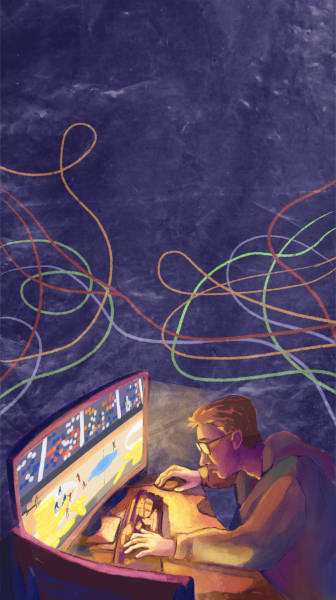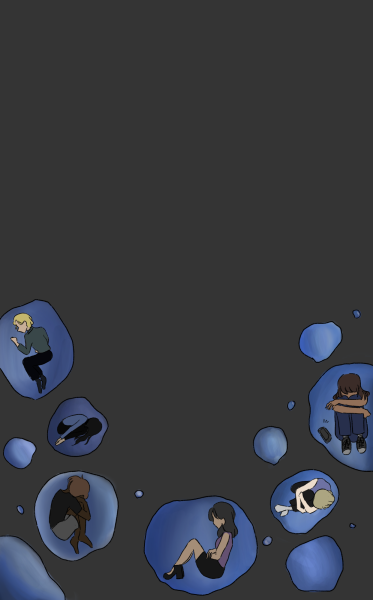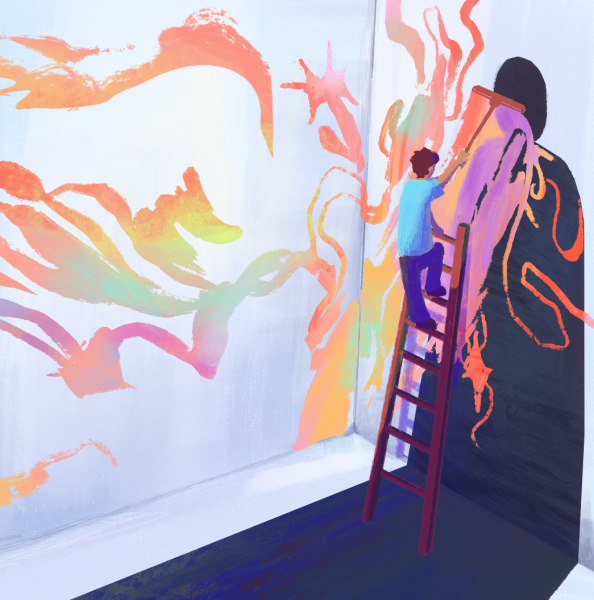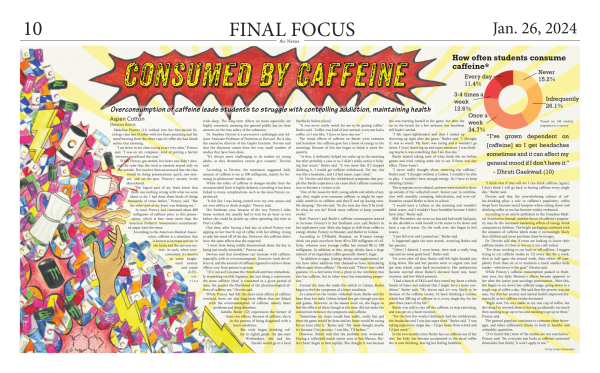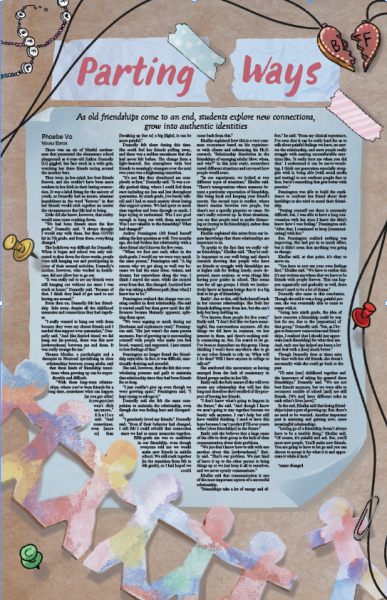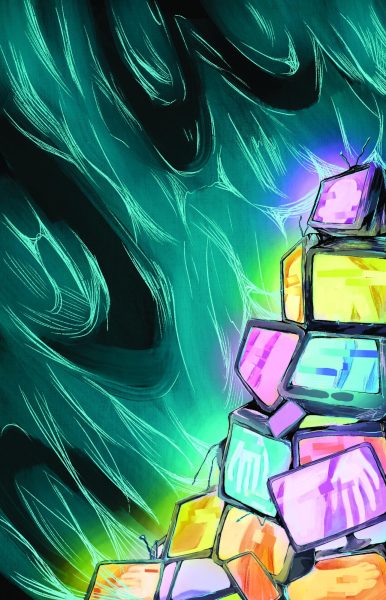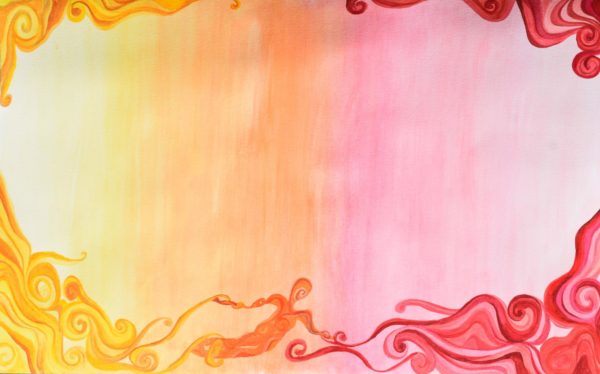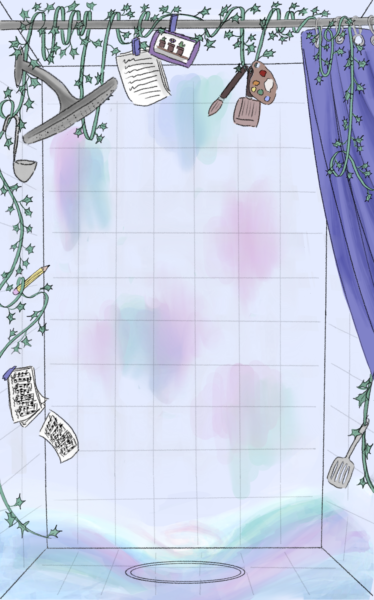Rustling with Maturity: Leaving Childhood Behind
Students, once eager to grow up, can only reminisce about their carefree childhoods as they are faced with the stressful realities of high school
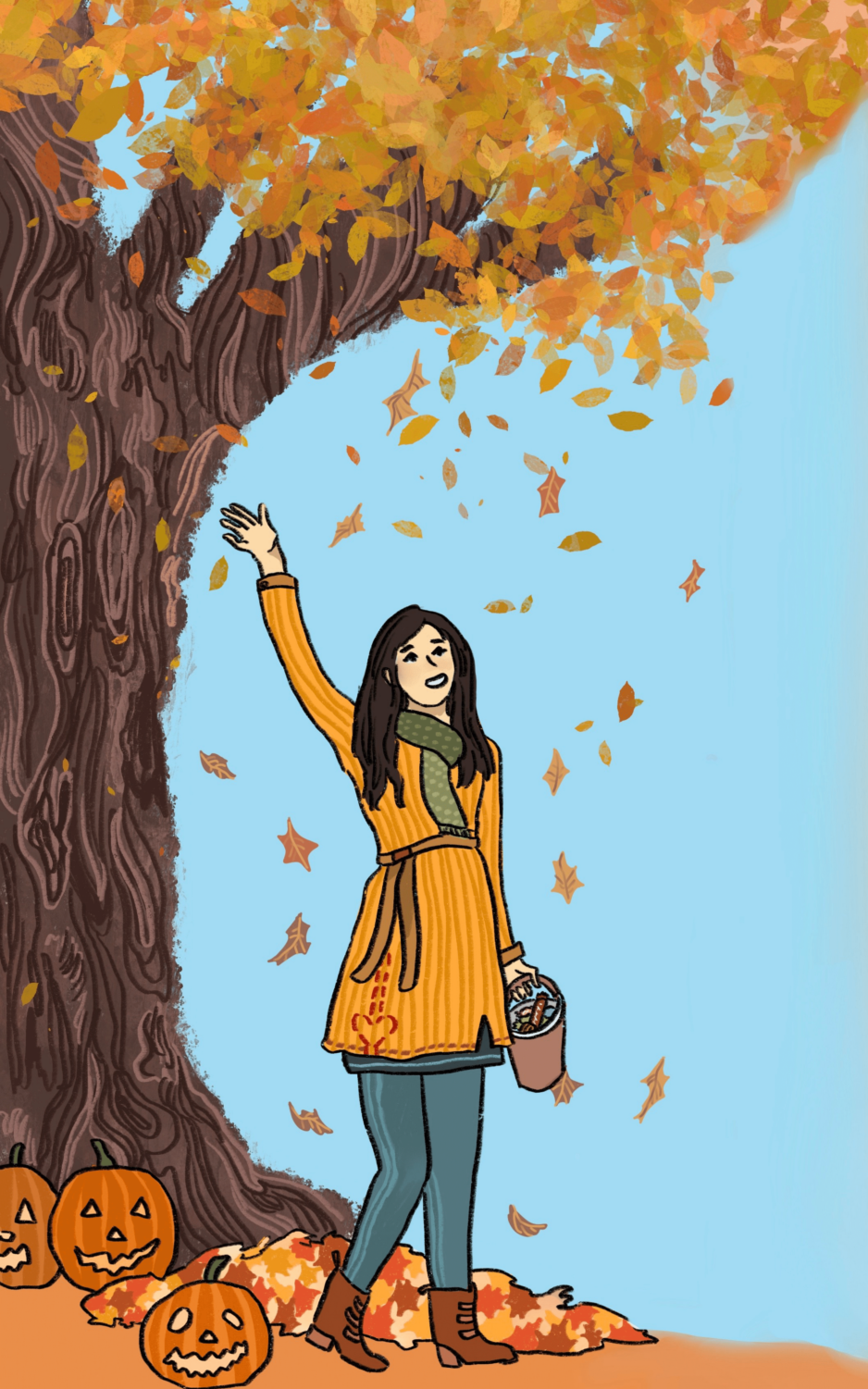
The last time Ally Diep (12) went trick-or-treating, she channeled one of her favorite Winnie-the-Pooh characters, Eeyore. As a part of her matching costume with her friends, she wore a blue tutu to match with the rest of her group. Like so many of the other kids on the sidewalks with her, Diep thoroughly enjoyed the experience—at the end of the night, she riffled gleefully through fistfuls of candy.
For the last two years, however, Diep has foregone dressing up, in order to supervise two younger siblings. Instead of carrying her own pillowcase, she helps her sister and brother carry theirs.
“After freshman year it was mainly me accompanying them [on Halloween],” Diep said. “So the focus wasn’t really on me, it was on making sure my siblings were safe and having a good time.”
To Diep, this transition from participation in—to supervision of—childhood tradition was only a normal part of growing up. After she got her license, helping her siblings trick-or-treat became only one of the many responsibilities she took on for her family. Diep began driving her siblings to and from after-school activities. While before this, she’d already felt herself moving away from the golden, unsullied moments of pure childhood that had once characterized elementary and parts of middle school, caring for her siblings was when she really had to learn to juggle various commitments, Diep says.
“I think especially when I got my license and I started to drive, I just really wasn’t a kid myself, or at least not in the same way that I used to be,” Diep said.
And that, of course, is only natural, says psychologist Sylvia Naar. Growing up is something that happens to everyone, and high school is the place where it happens the fastest for many students. In a hectic environment that combines both social and academic stimulus, over the course of four years, students mature and grow, both physically and mentally, at an exponential pace.
At times, this high pace has left Diep wondering where all the time went. As a senior, looking back from the near-summit of her high-school years, she said she feels infinitely removed from the naivety of her youth.
“I definitely think I started being more responsible because I had to be more responsible [for the people around me],” Diep said. “I can see it in the way I try to plan long-term around my big projects. I wouldn’t say I’m the most organized person ever, but when there are other people on the line, I find myself working really hard to step up.”
This phenomenon of rapid growth has biological roots in brain development at a high school age, Naar said. Naturally, many students welcome how quickly they approach adulthood.
Anika Seth (10) was once an eighth-grader who looked forward to moving up to high school. Whenever she watched TV shows about adolescents, she envisioned what it would be like to go to football games. Seth said she was excited to be just as cool as the girls in the movies were, the ones who both went to parties and succeeded academically.
“I was really looking forward to the football games, and the dances,” Seth said. “I had a really idealized version of high school in my head, without realizing what else was involved [in terms of academics].”
Likewise, Diep’s years as a lowerclassmen were characterized by a longing to be just as “cool” and “put-together” as the juniors and seniors she saw on campus; the ones who looked like they knew what they were doing.
“You think to yourself, ‘wow, they’re so cool, they know what they’re doing during finals week,’” Diep said. “Or ‘wow, they get to leave during lunch.’ A lot of seniors had two-by-two schedules and I just thought ‘wow, it’s so cool that they get to go home [early].’”
As a current senior, however, Diep has come to realize that the idyllic daydream of maturity is a far cry from what she’d imagined as a fresh-faced ninth-grader. Reality, she said, has been a hard thing to match with what she’s expected, at times. Even though she had many friends in grades above her, who told her stories of their own experiences, when the time came for her to take the same classes, Diep found herself at a loss.
“Even though I thought I had a lot of knowledge in advance, I still found myself floundering,” Diep said.
In many ways, she finds this representative of what life will be like as an adult. After she goes to college, she won’t have anyone holding her hand, as her parents did when she was a kid. Like her, Seth views high school as a microcosm of what real life is like.
“I know that someday I’ll have to make decisions by myself, and solve my own problems,” Seth said. “But putting myself into that context really makes me appreciate the life I have right now, because in many ways, I still am just a kid.”
Using high school as an opportunity for real growth and adjustment has always been a societal phenomenon.
According to Naar, certain changes to societal demands of teenagers mean that they are exhibiting adult behaviors at progressively younger and younger ages.
“It is a paradox because kids do not enter full adulthood until later in life compared to non-western cultures, and young adulthood extends well into the 20s, but the adult behaviors are starting earlier and earlier,” Naar said. “COVID-19 has caused additional stress, trauma and pressure to succeed under unreasonable conditions, so self-care is critical.”
Ironically, Diep said that the more relatively mature she is, the more she looks back on youthful naivety with fondness, instead of as something to escape. No matter what grade they’re in, however, for many students, maturation means growing out of old mindsets, and shifting into new ones, an experience which often leads to some startling life changes, as well as moments of reflection. In particular, she has a list of things that she’d like to tell her freshman self, chief of which is that growing up is not all that it’s cracked up to be.
“It’s not glitz and glamour,” Diep said. “Driving is not as fun as you think it is. It’s so easy to fall asleep when you’re going down the freeway. Just relish the ignorant blissfulness. Focus on your Honors English class. Go to all the school events. Definitely don’t worry about trying to grow up, because it comes naturally, and the more you worry the less fun your childhood is going to be.”
For students like Seth, who are stepping onto campus for the first time this year, this change was a pivot from the slow, sleepy pace of childhood. To Seth, in more ways than one, the difference in the way she approaches life as a high school student is vastly different from the uninhibited enthusiasm of middle school.
“I really think of October as finals month, instead of the month of Halloween,” Seth said. “I used to make a big deal out of Halloween as a kid, but now I just see it as a day I get some candy and hang out with friends.”
In other ways, as well, Seth’s mindset has shifted to put more priority on her grades. As a newly minted sophomore, for Seth, big milestones and celebrations don’t really feel big anymore.
The last time she really went all-out for her birthday was in eighth grade. For most of her childhood, her parents brought her and her friends to a ranch, where they ate cake together and took turns riding horses. In the past few years, she’s moved away from large festivities, as she comes to view each marker as less of a celebration, and more of a fact of time.
“I think losing some things is just a part of growing up,” Seth said. “I do miss it at times: how excited I was, how excited everyone was, but I feel like as time passes, your birthday just becomes another day.”
Another year comes and goes, and Seth said all she feels is more responsibility.
“I feel like there’s a huge difference between who I am as a high-schooler, and who I was as a middle-schooler,” Seth said. “Academically, especially, I don’t think I really realized how much of a jump there was between 8th and 9th grade.”
This jump is both a positive and negative thing for Diep. As she has evolved as a student and a person, she’s come to realize some things about both herself and the choices she made pertaining to school. While at times, academics felt like a rat race, Diep said she learned to become more responsible because of the pressure. Even so, she said she’s come to understand the importance of maintaining balance.
“Making the realization that being the best version of yourself academically is not the same as being the best version of yourself as an adult is really important,” Diep said.
In high school, Diep discarded old mindsets and formed new worldviews. Growing up meant moving beyond the boundaries of childhood, and confronting real problems. While ghosts, scary stories, and lurking shadows on the wall were all things that Diep was afraid of when she was young, as a senior, more realistic fears hover at the edges of her consciousness.
These days, she worries more about the ever-creeping deadline for college applications, as well as the looming future.
“[The last few months] have really heightened my fears of leaving high school, and leaving my parents behind when I go to college,” Diep said.
According to Naar, specific brain changes follow the period of development in high school, many of which can lead to these feelings of crisis.
“[In adolescents,] anxiety about the future is common,” Naar said. “Especially among those segments of the population that experience pressure to perform and achieve, there are often worries about measuring up to expectations.”
Seth herself has had to confront newfound pressures on the academic front. Each night she has around six hours of homework, and doesn’t get to bed until 2 or 3 a.m. Adjusting to this new schedule, as well as the various new academic pressures of the three AP classes (Psychology, Calculus AB, and Chemistry) she’s taking this term, culminated during her midterms.
“I remember that [week] was awful,” Seth said. “The sleep deprivation and stress was so much that I ended up having a panic attack.”
According to Naar, while pressure is normal, forcing maturity in situations of stress can be debilitating, and is unhealthy in the long term.
“Stress and anxiety are common and can be crippling,” Naar said. “Some students do not have a choice in this domain, so it is critical to find time for yourself and find things you enjoy, just as a kid who wants to have some fun.”
Ultimately, both Seth and Diep have had the realization that the pace at which they have moved, and are moving, may be faster than is truly comfortable. To Seth, in hindsight, the value of childhood lies in its freedom.
“I feel like I’ve been forced to grow up,” Seth said. “When I was younger I don’t think I valued how much free time I had, or how much easier things were. Now all of a sudden I’m forced to do all of these things to get into college, which somewhat determines my life. It feels like I’ve been forced to grow up a lot faster and sooner than I’d anticipated.”
As a part of her high-school experience, Diep has gained both life skills and formative experiences in the last three and a half years. She’s learned how to cut her own bangs, experimented with various styles, and leveled up from kitchen scissors to professional hair scissors off amazon. Yet fundamentally, she says, maturing has led to a certain sense of dissonance. To Diep, the thought of her impending adulthood is a bittersweet one—while she appreciates the time she has left, in many ways, this year she said she feels like it’s hurtling past her at break-neck speed.
“While I’m excited for what’s to come, I am pretty terrified of leaving behind this part of my life,” Diep said. “High school is such a defining period of our lives, because so many of my decisions this year will affect my future. But sometimes, I just don’t feel completely mature enough in many ways.”
This experience of a sudden realization of how fast time flies is a common one for high-schoolers. In order to cope with this newfound sense of crisis, both Seth and Diep find themselves returning to certain childhood experiences as a way of slowing down the pace of their lives.
One way Diep has done this is by reviving old habits she had tried to grow out of as a kid.
“When I was younger, I really wanted to get older as fast as possible,” Diep said. “And for some reason, I always thought that part of that [maturing process] meant not really celebrating my birthday.”
Because Diep’s parents didn’t focus on celebrating milestones of age, she took them as an example of how true adults were supposed to behave. This meant never telling her friends her birth date, or being bashful when people asked her what she wanted as a present. Now that she’s older, however, she’s come to realize that an integral part of being a truly mature person is learning to prioritize your own well-being and growth, even if that means doing traditionally ‘childish’ things.
“I will wholeheartedly tell my friends my birthday, and what I want,” Diep said. “I kind of embrace a little selfishness, like a little kid in a way, but I think growing up doesn’t mean you should lose some of the small things that make you happy. We’re only on this planet for so many years, and I think we should make the best of them.”
Likewise, Seth is adjusting to the demands of high school by learning to pace herself.
“I think I’m really taking things day-by-day at this point,” Seth said. “Instead of thinking about how I have however many months left of the school year, and then college applications, I’m just trying to stay in the present.”
According to Naar this kind of mindfulness, as well as living in the present, can help adolescents cope with the various anxieties of growing up.
“Mindfulness/meditation has positive effects on so many areas of psychological and physical functioning,” Naar said. “Slowing down and paying attention to the present is a key part of this practice.”
As a part of this purposeful slowing down, this year, Diep is going trick or treating with her family again for a final time.
“I don’t think students should stop trick-or-treating just because they get older,” Diep said. “I don’t think there should ever be a time in your life when you stop doing something you like because you aged one year.”
On Halloween, she’ll be dressed in a [costume], walking hand in hand with her siblings. As a last hurrah, before she leaves the tradition well and truly behind, a token of the care-freeness of her youth.



